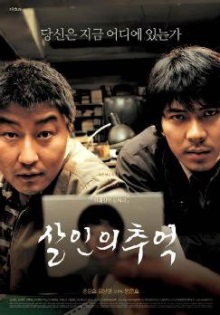
I’ve been paying more attention to films recently so I think I should try to write more about them. My wife and I originally tried to watch this film a couple of years ago, based on the recommendation of a film aficionado friend of ours. But my wife fell asleep halfway through the film and I didn’t feel dedicated enough to continue watching without her. Recently the same friend remarked that South Korea has been producing quite a few films of high calibre recently and reiterated this recommendation, saying that our film appreciation abilities have probably improved enough by now to properly watch it.
It turns out that he was right. In fact, I liked it so much I can’t understand why I couldn’t get through it the first time around. It’s loosely based on the real-life Hwaseong murders, the first known serial murders in South Korea between 1986 and 1991. A local detective, Park Doo-man, played by the ubiquitous Song Kang-ho, is initially placed in charge of investigating the first murder in the rural area of Hwaseong. It quickly becomes evident that the skills and facilities of the local police are completely inadequate to handle a crime of this seriousness, and he is joined by a detective from Seoul, Seo Tae-yoon.
What makes this film so interesting is that its plot is inextricably linked to the era it is set in. South Korea has yet to become the technological powerhouse it is today, so their forensic science, especially in rural Hwaseong, in pathetically inadequate and they even have to send DNA samples to the US for analysis (Japan in real life). It is also ruled by a military dictatorship which creates difficulties for the investigators. They have insufficient manpower when extra police are called away to quell protests and the frequent raid drills regularly clear the streets at night, helping the serial murderer to hunt without hindrance.
And of course the mindset of the detectives is very much a product of the era they live in. Park and his underlings think nothing of beating suspects to within an inch of their lives to make them confess. They joke that the police are so brutal that even schoolchildren know that the police beat people up. They even find it perfectly normal to beat up a suspect one day and then to a restaurant owned by that suspect for dinner another day. Detective Seo brings a more sophisticated form of investigating with him, relying on deduction and documentary evidence. This understandably creates conflict between the two detectives with Park pegging Seo as a snobbish interloper from the capital who looks down on them.
Like all good crime dramas, the film is more about the personal journeys the characters take than the plot itself. Seo’s clever theories seem to work at first, especially compared with Park’s brutish methods, but we quickly see that it is too easy for the detectives to see what they want to see and create coherent narratives out of disparate clues even when things are not necessarily connected. At the end of the film, regardless of the results of the investigations, our detectives are no longer the same people they started out as.
All of this comes in a package with superb acting and directing. There is constant tension throughout and we are never quite certain what will happen next. Not only is it a riveting murder mystery, it’s a film that perfectly capture the zeitgeist of South Korea as it was in the 1980s. The end result is a film that is characteristically and unmistakably Korean, complete with their trademark light buffoonery, but it is also world-class cinema.